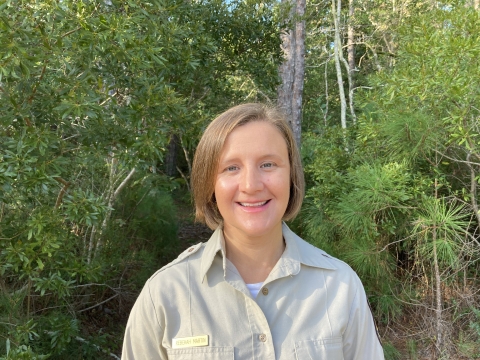At first glance, it may seem as though it’s simply a numbers game:
- 22 years with the U.S. Fish and Wildlife Service
- $27.25 million awarded from the Inflation Reduction Act
- 400,000 acres of habitat with more than a dozen endangered or threatened species
- Nine national wildlife refuges, 35 employees, more than 400 volunteers
- One national award
It all adds up for the National Wildlife Refuge Association. The non-profit organization recently selected Rebekah Martin, project leader for the U.S. Fish and Wildlife Service’s Coastal North Carolina National Wildlife Refuge Complex, as the 2023 Paul Kroegel National Wildlife Refuge Manager of the Year. The award is named for the first manager of the first national wildlife refuge national wildlife refuge
A national wildlife refuge is typically a contiguous area of land and water managed by the U.S. Fish and Wildlife Service for the conservation and, where appropriate, restoration of fish, wildlife and plant resources and their habitats for the benefit of present and future generations of Americans.
Learn more about national wildlife refuge , established in 1903 at Pelican Island in Florida.
"I am so proud of Rebekah," said Mike Oetker, acting regional director of the U.S. Fish and Wildlife Service Southeast Region. "She is an incredible leader and collaborator of landscape-scale wildlife conservation."
Martin humbly claims that two factors equate to any success she’s achieved: relationships and collaboration.
She juggles a lot of responsibilities but invests a great deal of time and energy into building and maintaining relationships. She routinely engages with leadership, peers, refuges’ teams, civic and elected officials, community members, private landowners, partners, state and federal agencies, and, most importantly, the land and wildlife she’s charged with protecting.
“Rebekah’s ability to form unique partnerships, build relationships and communicate with others, especially the public, is where she excels,” said Emery Hoyle, refuge supervisor for several states in the Southeast Region. “Her engagement with others comes in many forms and often includes issues deemed controversial. Her technical skills, in combination with her ability to build interpersonal relationships, makes her admired by not only her leadership but the team she supports and works beside daily. Rebekah encourages her team to think creatively to solve complex conservation challenges and support geographic stakeholder discussions.”
Martin looks for opportunities to share her passion and enthusiasm for the lands, waters, and wildlife of northeastern North Carolina. She aims to take a thoughtful approach to conservation that includes pooling limited resources to benefit local communities and wildlife. She routinely reaches out to hear others’ perspectives and explores innovative ways to collaborate.
“Rebekah understands that solid partnerships, cemented by trust and communication, are key to addressing the conservation challenges of today” Hoyle said. "She is purposeful, sincere, and authentic in her relationships. Rebekah strategically and proactively reaches out to build relationships with county and state government officials, non-governmental agencies, and private landowners to advance conservation in the Albemarle-Pamlico region.”
Martin grew up on a farm in Warsaw, Virginia, which is where her love for the outdoors – and her appreciation for the natural world – began. Her relationship with the Service started 22 years ago as a student trainee. She has served in her current role at the Coastal North Carolina National Wildlife Refuge Complex since 2017.
During her tenure, the Complex has garnered many conservation accomplishments. Of note, Martin works closely with community members and partners on the education and recovery of the endangered red wolf. Martin also creates partnerships to protect pollinators, bats, and migratory birds. Several endangered species, like the Eastern black rail, the Northern long-eared bat, and the Cape Fear shiner, protected by the Endangered Species Act benefit from Martin’s methodical approach.
Partners and community members are also working with Martin to restore peat lands in the coastal North Carolina region. Over tens of thousands of years, carbon-rich peat soils have accumulated in the oxygen-poor wetlands, reaching depths of 15 feet in portions of the refuges. These pocosins, Algonquin for “swamp on a hill,” within the Complex comprise the unique peatland habitat for which the Service has responsibility. The Service has restored more than 37,000 acres of pocosin habitat at Pocosin Lakes National Wildlife Refuge, one of the nine refuges in the Complex.
“Rebekah understands the need to restore peat moisture to stop the loss of these combustible soils to oxidation and catastrophic wildfire,” Hoyle said. "The cost of inaction in terms of carbon loss to the atmosphere and elevation loss in areas with high coastal inundation risk is too great. The restoration is notable and considered one of the nation’s largest wetlands restoration projects of its kind and is considered a model internationally. It is also a great example of how the Service is working together with federal, state, and private partners to conserve one of the nation’s most unique habitats."
The list of accomplishments is quite long. To Martin, though, most notable is the receipt of $27.25 million from the Inflation Reduction Act. This historic funding will be invested in climate-related and conservation projects throughout the Albemarle-Pamlico region in Eastern North Carolina. The Albemarle-Pamlico Estuarine System is home to some of the most climate-vulnerable counties in the nation that face sea level rise, catastrophic fire risk, and changes in storm intensity and frequency. The IRA investment will fund nature-based solutions that improve resiliency to climate change climate change
Climate change includes both global warming driven by human-induced emissions of greenhouse gases and the resulting large-scale shifts in weather patterns. Though there have been previous periods of climatic change, since the mid-20th century humans have had an unprecedented impact on Earth's climate system and caused change on a global scale.
Learn more about climate change on wildlife refuges and nearby state wildlife management areas. The once-in-a-lifetime investment will benefit under-resourced and underserved communities surrounding the federal and state conservation lands of the Albemarle-Pamlico.
“As project leader for the Coastal N.C. Refuges Complex, Rebekah has responsibility for a suite of public lands that are on the front lines to impacts from a changing climate, provide critical functions as natural solutions to climate change, and are the keystones of resilient coasts, wetlands, and floodplains,” said Chuck Peoples, director of conservation programs, North Carolina Chapter, The Nature Conservancy. “We appreciate the forward-looking and holistic stewardship and restoration approach Rebekah brings to both the on-the-ground management and in her many collaborations with The Nature Conservancy.”
Martin’s leadership and commitment to working with others to further conservation priorities improved relationships and coordination at the federal level as well. She led a coalition of Service employees and representatives from multiple federal agencies working in the Albemarle Pamlico Estuary as they explore ways to meet climate-induced challenges.
In addition to continuing her focused, collaborative conservation efforts, Martin co-leads the Service’s America the Beautiful Increased Access to Outdoor Recreation team. This group works to boost access to public lands for all Americans, especially diverse and underrepresented individuals and communities.
“We have so much important work to do in eastern North Carolina. Being in strong relationships with partners, landowners, and community and elected leaders is critical,” Martin said. “We are all teaming up on conservation efforts to ensure our precious wildlife, our majestic landscape, our unique ecosystems, and our special way of life are protected for all people and future generations to enjoy.”





